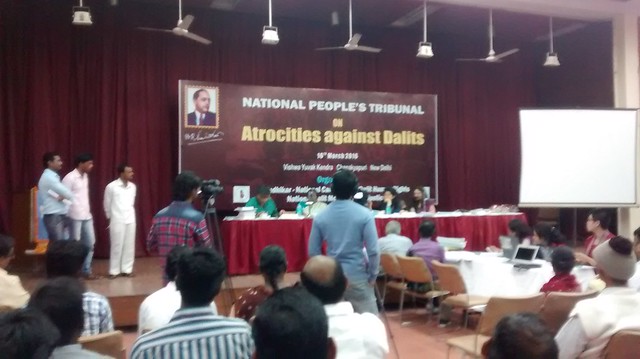By Amit Kumar
This is the last of the four-part series on cases of Dalit atrocities in India which were brought up during a tribunal held by the National Campaign on Dalit Human Rights in collaboration with other other liked-minded associations.
If there was one salient feature of the recent National People’s Tribunal on caste atrocities against the Dalits in India, it was that almost always, it is them who get punished even if they are on the receiving end of the injustices meted out to them. In the case of Sunped, it was the Dalits who were locked in jail while the people who burnt two innocent kids alive roam free; in Bihar, again, there was a case registered against the Dalits even though their houses were burnt down, and in Gujarat, the only case that was registered was against the Dalits for protesting the death of one of their own, even as the cops who shot them remain free.

In the fourth part of our series, we look at the case of Jagseer Singh, a Ramdasia Sikh from the district of Shri Muktsar Sahib, Punjab. The 45-year-old resident of village Gulabewala of the same district had come to the Tribunal to not only talk about his sufferings as a bonded labour, but also of the brutal game of vindictive politics that had been played on him. Jasgeer’s case was slightly different to other cases of atrocities: in most other cases, the forms of violence had been more brutal: arson attacks, rape, murder, etc. However, while bonded labour has often been raised as a concern in India, it has essentially focused on either child labour, or on the population as a whole. Nevertheless, it does not take much to understand that even in this case, caste plays an important angle.
Ramdasia Sikhs are categorized as Schedule Castes in the state of Punjab. In the case of Singh, it is clear that his attempt to fight against bonded labour has been made even tougher because his employer is a police officer. One of the consistent themes of the Tribunal was the way in which the Police and the upper-castes work, almost always in tandem, to ensure that Dalits are denied their rights. In the case of Jasgeer, it was no different.
Between June and December 2015, Jasgeer was employed by Gurdev Singh Brar, who is a retired police official as an agricultural worker. Initially, Jasgeer was given an advance of Rs 25,000 and his salary was fixed at Rs 60,000 per year, which translates to less than Rs 200 per day. During this period, Jasgeer was made to work in sub-human conditions and was allowed to take off only one night per week. For three months, despite repeated requests to his employer, he was not allowed to go home, and was made to work day and night for zero money. Jasgeer, who is illiterate, was also made to give his thumb print on blank papers and if ever he was unable to work, his employer Gurdev also imposed a ‘fine’. Given that Jasgeer wasn’t even being paid a salary, one can only wonder what the fine entailed; nevertheless, finally Jasgeer decided to take the matter to the police and subsequently, filed a complaint with the SSP, Muktsar Sahib, on December 15. Thanks to the works of local anti-caste social workers, he also filed a complaint against his employer in the National Human Rights Commission.
But this is just one half of the story. While technically, the law is supposed to take its own course, it was very clear that the act of revolt by Jasgeer did not please his employer: Gurdev instead filed a complaint against Jasgeer for not working enough, and sought Rs 1.5 lakh in damages. Even as the SSP was supposed to be looking into Jasgeer’s complaint and take action against Gurdev, the police, in what has been a norm for years now, decided to take action against Jasgeer instead. He ended up spending 13 days in jail due to his employer’s complaint, even though he is fighting a case against being made to work as bonded labour.
The other important aspect, which also gained a lot of attention and comments from the jury at the Tribunal, was the manner in which the SCs and STs (PoA) Rules, 1995, has been flouted or ignored. In the case of Jasgeer, no spot investigation was carried by the Police, which is in violation of Rule 6 of the aforementioned Rules. Also, despite letters to SSP and NHRC, no complaints were filed against the offender; instead, as has become the norm, Jasgeer has been under severe pressure to withdraw his complaints and he has been threatened of dire consequences if he doesn’t do so.
The cops, who have shown an alarming sense of partiality in dealing with Jasgeer’s case, have also not bothered with protecting the live of Jasgeer despite the repeated threats. And to think, that bonded labour was illegal in India: it most certainly does not seem to the case, at least when the victims are Dalits.
